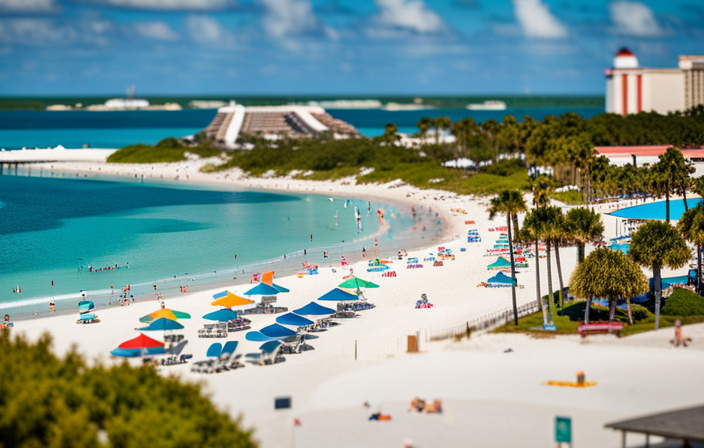The allure of a career at sea captivated me, as the prospect of working on a cruise ship beckoned enticingly. The thought of journeying to distant, exotic destinations while earning a living seemed like a dream come true.
In this article, I will share valuable insights and tips on how to secure a job on a cruise ship. From researching job opportunities to navigating the application process, I will guide you through each step towards making your seafaring dreams a reality.
So, ready your sea legs and let’s embark on this exciting journey together.
Key Takeaways
- Research specific positions and qualifications required for jobs on a cruise ship
- Tailor your resume and cover letter to highlight customer service or hospitality experience
- Gather required documents and certifications to stand out from the competition
- Create a strong personal brand by showcasing unique skills and experiences
Researching Job Opportunities
When researching job opportunities on a cruise ship, it’s important to consider the specific positions available and the qualifications required. The job search for cruise ship positions can be competitive due to the limited number of openings and the high demand for these jobs.
It’s crucial to understand the job market and identify the positions that align with your skills and interests. Take the time to research different cruise lines and their hiring practices. Look for job postings on their websites or through reputable job search platforms. Pay attention to the qualifications required for each position and tailor your application accordingly.
By thoroughly researching the job market, you can increase your chances of finding the right opportunity on a cruise ship.
Transitioning into the next section about building a strong resume and cover letter, it’s essential to showcase your qualifications effectively to stand out from other applicants.
Building a Strong Resume and Cover Letter
To create a strong resume and cover letter for a cruise ship position, make sure to highlight your relevant experience and skills. When building a professional network, it’s essential to showcase your relevant experience to stand out from other candidates. Here are some key points to consider:
- Tailor your resume and cover letter to the specific cruise ship position you are applying for.
- Include any previous experience working in customer service or hospitality, as these skills are highly valued in the cruise industry.
- Highlight any certifications or training you have received, such as CPR or first aid.
- Emphasize your ability to work well in a team and adapt to different environments.
- Provide examples of your problem-solving abilities and excellent communication skills.
By following these guidelines, you will increase your chances of getting noticed by hiring managers and ultimately landing a job on a cruise ship.
When navigating the application process, there are additional steps you can take to further enhance your chances of success.
Navigating the Application Process
When it comes to applying for a job on a cruise ship, there are certain documents and certifications that are typically required.
These may include your passport, seafarer’s book, and relevant training certificates such as STCW (Standards of Training, Certification, and Watchkeeping).
It is important to ensure that you have all the necessary paperwork in order to stand out from the competition and increase your chances of getting hired.
Required Documents and Certifications
You’ll need to have the necessary documents and certifications to get a job on a cruise ship. The required documents typically include a valid passport, a seafarer’s medical certificate, and a criminal background check. These documents are essential for verifying your identity, ensuring your health and safety, and establishing your trustworthiness.
Additionally, certain positions may require specific certifications or licenses, such as lifeguard certification or a maritime qualification. To obtain these certifications, you may need to complete training programs that are specifically designed for cruise ship employees. These programs usually cover topics such as safety procedures, emergency response, customer service, and job-specific skills.
It is crucial to ensure that you have all the necessary documents and certifications before applying for a job on a cruise ship, as this will greatly increase your chances of being considered for a position. By demonstrating that you have the required qualifications and credentials, you can stand out from the competition and increase your chances of securing a job on a cruise ship.
Standing Out From Competition
By highlighting your unique skills and experiences, you can distinguish yourself from other applicants and increase your chances of standing out in the competitive job market.
One effective way to do this is through personal branding. Personal branding involves creating a strong and authentic image that showcases your strengths and values. It is about presenting yourself as a professional who brings something unique to the table.
To stand out, start by identifying your strengths, passions, and areas of expertise. Then, tailor your resume and cover letter to highlight these qualities. Additionally, use social media platforms to showcase your professional achievements and engage with industry professionals.
By developing a strong personal brand, you can make a lasting impression on employers and increase your chances of landing a job on a cruise ship.
As you prepare for interviews and auditions, it is important to showcase your skills and personality in a confident and professional manner.
Preparing for Interviews and Auditions
To ace the interviews and auditions, make sure to practice your answers and rehearse your performance beforehand. Interview etiquette is crucial when it comes to making a positive impression on potential employers.
Remember to dress professionally, arrive on time, and maintain good eye contact throughout the interview. It’s also important to research the company and the cruise industry in general, so you can demonstrate your knowledge and interest during the interview. Prepare answers to common interview questions, such as your strengths and weaknesses, and be ready to provide specific examples that highlight your skills and experiences.
Additionally, rehearse your performance for auditions by practicing your act or showcasing your talents. By preparing thoroughly, you will feel more confident and increase your chances of success.
Now let’s move on to understanding the hiring process and how to navigate it effectively.
Understanding the Hiring Process
Understanding the hiring process can help you navigate it effectively and increase your chances of landing a job on a cruise ship. Here are some key points to keep in mind:
-
Resume and Application: Make sure your resume is updated and tailored to the specific job you are applying for. Highlight relevant experience and skills that make you a strong candidate.
-
Interview Preparation: Research the cruise line you are applying to and familiarize yourself with their values, mission, and industry trends. Practice answering common interview questions such as ‘Why do you want to work on a cruise ship?’ and ‘How do you handle difficult customers?’
-
Professionalism and Presentation: Dress appropriately for interviews, both in-person and virtual. Maintain a professional demeanor and be polite and respectful to everyone you encounter during the hiring process.
Understanding the hiring process is just the first step in getting a job on a cruise ship. Next, you’ll need to obtain the necessary certifications and training to qualify for the position.
Obtaining the Necessary Certifications and Training
When it comes to working on a cruise ship, there are certain certifications and training that are required in order to qualify for a position. These certifications can vary depending on the specific role you are interested in, but some common ones include STCW certification, CPR and first aid training, and food safety certification.
Additionally, there are accredited courses and programs available that can provide you with the necessary skills and knowledge to succeed in the cruise industry. These programs often cover topics such as customer service, hospitality management, and maritime safety.
Required Certifications and Training
Before applying for a job on a cruise ship, it’s important to research the required certifications and training. The certification requirements and training options vary depending on the specific job you are interested in. Here are some key points to consider:
-
STCW Certification: This is a mandatory certification for all crew members and includes courses on safety, security, and emergency procedures.
-
Medical Certification: Some positions, such as nurses or doctors, require specific medical certifications.
-
Culinary Training: If you are interested in working in the ship’s kitchen, culinary training or experience is often required.
-
Language Proficiency: Depending on the cruise line, fluency in multiple languages may be necessary, especially for positions that involve guest interaction.
-
Specialized Training: Certain jobs, like entertainment or technical roles, may require additional specialized training or experience.
Understanding these certification requirements and training options will help you determine the necessary steps to secure a job on a cruise ship.
Moving forward, let’s delve into the topic of accredited courses and programs that can help you meet these requirements.
Accredited Courses and Programs
After obtaining the required certifications and training, it’s important to enhance your skills and knowledge through accredited courses and programs. These courses are specifically designed to provide industry-specific skill development, making you more competitive in the job market. By enrolling in these courses, you can acquire specialized knowledge in areas such as hospitality, customer service, culinary arts, and maritime operations. These programs are offered by reputable institutions and are recognized by the cruise ship industry.
To give you an idea of the types of courses available, here’s a sample table showcasing some accredited programs:
| Course | Institution | Duration |
|---|---|---|
| Cruise Ship Management | International Maritime Institute | 6 months |
| Culinary Arts | Cruise Ship Culinary Academy | 4 weeks |
| Maritime Safety | Maritime Training Institute | 2 weeks |
| Customer Service | Hospitality Training Center | 1 month |
Industry-Specific Skill Development
To enhance your skills and increase your competitiveness in the job market, it’s important to invest in industry-specific skill development through accredited courses and programs.
Industry specific training is crucial as it provides you with the necessary knowledge and expertise required for your desired job on a cruise ship. By enrolling in these courses, you will gain a deeper understanding of the industry, learn about the latest trends and technologies, and develop the specific skills needed to excel in your chosen role.
Additionally, it’s essential to stay updated with job market analysis to identify the current demand for skills in the cruise industry. This will help you tailor your training to meet the industry’s needs and increase your chances of securing a job.
With the right industry-specific training and a thorough understanding of the job market, you can make a successful transition to life at sea.
Making a Successful Transition to Life at Sea
Once you’re on board, it’s important to quickly adapt to the unique challenges and lifestyle of living and working on a cruise ship. Adjusting to shipboard life can be a significant transition, but with the right mindset and preparation, it can be a rewarding experience.
Here are three key aspects to consider when making the shift:
-
Embrace the close quarters: Living in a small cabin and sharing common spaces with coworkers can be challenging at first. It’s important to be respectful of personal space and maintain good relationships with your colleagues.
-
Manage your time effectively: Working on a cruise ship often means long hours and irregular schedules. Prioritize your tasks and establish a routine to ensure you have enough rest and leisure time.
-
Stay connected with loved ones: Being away from family and friends for extended periods can be tough. Utilize the onboard communication options or internet access to stay in touch and maintain relationships.
Frequently Asked Questions
What Are the Typical Working Hours on a Cruise Ship?
Typical working hours on a cruise ship can vary, but generally, shift schedules can be demanding. It’s important to find a work-life balance and make the most of your time off.
What Is the Average Salary Range for Jobs on a Cruise Ship?
When it comes to job opportunities on a cruise ship, the average salary range varies depending on the position. From my experience, salaries can range from a few thousand to tens of thousands of dollars per month.
Are There Any Age Restrictions for Working on a Cruise Ship?
Age requirements vary by cruise line and position, but there are generally no age limits for working on a cruise ship. However, certain roles may have physical demands or require a minimum age for legal reasons.
What Is the Process for Obtaining a Visa to Work on a Cruise Ship?
Obtaining a visa for working on a cruise ship involves a visa application process and meeting specific documentation requirements. It’s important to research the specific visa requirements for the country you’ll be working in.
How Long Is the Typical Contract Duration for Employees on a Cruise Ship?
How long do employees typically work on a cruise ship? Contracts can vary, but the average duration is around 6-8 months. As an employee, you’ll receive benefits like accommodation, meals, and the opportunity to explore different ports.
Conclusion
In conclusion, obtaining a job on a cruise ship requires thorough research, a strong resume and cover letter, and careful navigation of the application and interview processes.
It is important to understand the hiring process and to obtain the necessary certifications and training. Making a successful transition to life at sea can be challenging, but with determination and preparation, it is possible to embark on a rewarding career in the cruise industry.
Did you know that the cruise industry is projected to grow by 6.8% annually from 2020 to 2027? This statistic highlights the promising job opportunities that exist in this industry.










